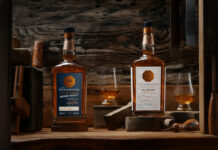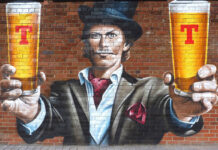
CRAFT beer has been one of the Scottish on-trade’s biggest success stories in recent years – and the bubble shows no sign of bursting any time soon.
A growing number of Scotland’s pubs and bars have expanded their beer offers to include brews from all corners of the country, with pub customers now arguably having more choice in beer than they’ve ever had.
However, there is still said to be considerable room for growth in the category, which operators can capitalise on with the right range.
Andrew Chapman, chief operating officer at Keith Brewery, said the diversity of available beers should help to keep craft beer fresh for some time to come.
He said: “Craft beer continues to grow in Scotland. There are more breweries in Scotland now than at any time over the last 60 years.
“Consumers continue to look for variety in their beverages.
“They look for new flavours, styles and interesting, creative approaches to their beer.”
These creative approaches will include a variety of weird and wonderful ingredients, as well as different styles.
Chapman predicted that bigger flavours and lower alcohol content could be the next major trends in the category.
“Specialist beers will continue to evolve and grow, from standard fruit beers to more intricate mixtures and blends of tastes,” he said.
“Spices will become more common, as will strong flavoured vegetables.
“ABVs may continue to decrease as the consumer looks for taste over strength.”
Try different things, encourage customers to try them, and see what works well.
The over-arching term ‘craft beer’ has become quite abstract, as there is little direct agreement as to what a craft beer actually is.
In the US, the American Brewers Association issued a seven point measure of what a truly craft beer should be and, last month, looking for a similar consensus, The Society of Independent Brewers in the UK issued its own call for clarity, as production methods vary profoundly across the category.
However, James Dempsey, who launched Eyeball Brewing last year, said the category has “come too far for there to be one universally agreed definition of craft beer”.
“What we should accept, however, is that craft refers to a collection of values to do with the production process, ingredients, and experience of drinking a beer,” he said.
Even though the struggle for a definitive answer to the craft question is a contentious issue among beer firms and connoisseurs, Paul Fallen, of Fallen Brewing, believes that few consumers have hang-ups about how their beer is made, as long as they enjoy it.
He said: “The vast majority of drinkers have very little interest and if the beer tastes great, they probably don’t worry too much about who brews it.
“It’s very difficult to define something that covers such a vast range of products and in so many different formats.
“If it was our choice we’d probably just call everything ‘beer’ and leave it to the consumer to decide whether it’s great beer or not.”
Naturally the bottom line for operators will always be revenue, and what really matters is how they can translate craft beer’s rising prominence to improved sales in their outlets.
Brewers advised licensees to stock a range that includes different styles and distinctive flavours, as well as ensuring their staff are knowledgeable about the products and can pick up on what their patrons want.
Vice-president of marketing at Carlsberg, Liam Newton, said the “key consideration for operators reviewing their craft beer range is variety” due to “consumers becoming increasingly interested in creating a personalised experience through choice”.
“Connecting, engaging and talking to drinkers during the decision-making process is essential to provide a unique and special experience, which in turn creates a reason to return to that venue,” said Newton.
We’ve come too far for there to be one universally agreed definition of ‘craft beer’.
Dempsey at Eyeball Brewing agreed, and encouraged bar staff to tempt traditional beer drinkers to taste a craft equivalent, saying: “Do different things, encourage customers to try them, and see what works well.
“Try to offer a range, as opposed to a number of similar strength IPAs.
“The key to success with craft beer is knowledgeable and enthusiastic staff who are brought into the project.
“Getting staff on board and talking with customers about the products is the most important thing.
“Working with breweries who are willing to help get staff up to speed, as we are, is always a good idea too.”
Fallen of Fallen Brewing said that offering a varied selection of craft beers has been made easier by the burgeoning selection becoming available in space-saving cans, allowing bars to have dedicated fridges from “a range of the best breweries”.
He said: “It’s a real point of differentiation which also offers the benefit to the licensee of taking up considerably less space than an equivalent bottle range whilst offering an increased range to customers.”




















